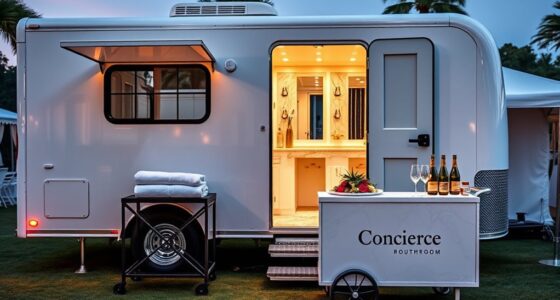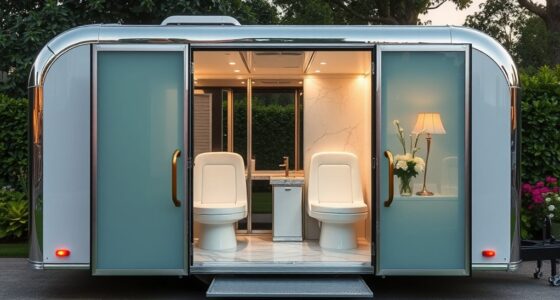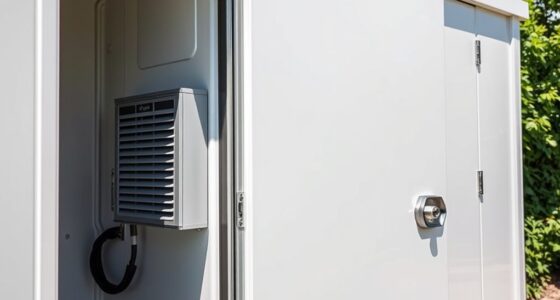When deciding whether to lease or buy high-end restroom trailers, consider your short- and long-term needs. Leasing offers lower upfront costs and flexibility for temporary use, while buying involves higher initial investment but can save money over time if used frequently. Think about maintenance responsibilities, usage patterns, and budget constraints. To make the best choice, weigh these factors carefully, and you’ll discover more insights to help guide your decision.
Key Takeaways
- Assess your short-term versus long-term needs to determine if leasing’s flexibility or buying’s cost savings suits your situation.
- Consider total costs over time, including upfront payments, maintenance, and potential resale value, to choose the most economical option.
- Review lease agreements carefully to understand included maintenance responsibilities and potential hidden costs.
- Evaluate usage frequency—regular, long-term use favors buying, while infrequent or temporary needs favor leasing.
- Weigh your budget constraints against control, customization options, and ongoing expenses for an informed decision.

Are you unsure whether to lease or buy a restroom trailer for your event or business? Deciding between these options requires careful consideration of several factors, especially when it comes to cost analysis and maintenance responsibilities. When evaluating your options, you need to understand how each choice impacts your budget over time and what ongoing upkeep will entail.
Leasing a restroom trailer often appears more affordable upfront, making it attractive if your budget is tight or if you only need the trailer for a short-term event. With a lease, you typically pay a fixed monthly fee, which can simplify your budgeting and reduce initial expenses. This approach can be especially beneficial if you want to avoid large capital expenditures and prefer predictable costs. However, it’s important to conduct a thorough cost analysis. Over the long run, leasing may become more expensive, especially if you need the trailer for an extended period or frequently use multiple units. Additionally, some lease agreements include maintenance clauses, but others may leave you responsible for certain upkeep tasks, which can add to the overall expense.
Leasing offers low upfront costs but may become costly over time with maintenance and extended use.
Buying a restroom trailer involves a higher upfront investment, but it can be more cost-effective over time if you plan to use it regularly. When you purchase, you own the trailer outright, giving you complete control over its use and any necessary modifications. From a cost analysis perspective, buying might seem expensive initially, but it can save you money in the long run by eliminating ongoing lease payments. Keep in mind, though, that owning a trailer means assuming all maintenance responsibilities. You’ll need to budget for routine inspections, repairs, and cleaning, which can add up if the trailer is heavily used or if issues arise unexpectedly. Proper maintenance is essential to guarantee the trailer remains functional, hygienic, and visually appealing to your clients or guests.
Ultimately, your decision hinges on your specific needs and financial situation. If you value flexibility, lower initial costs, and minimal maintenance responsibility, leasing might be the best route. Conversely, if you plan to use the trailer frequently and want long-term savings, purchasing could be more advantageous, provided you’re prepared to handle ongoing maintenance. Both options require a clear understanding of the long-term implications, so take the time to evaluate your usage patterns, budget constraints, and willingness to take on maintenance responsibilities before making your choice.
Frequently Asked Questions
What Are the Tax Implications of Leasing Versus Buying?
When deciding to lease or buy, consider the tax benefits and depreciation strategies. Leasing often offers immediate tax deductions on lease payments, simplifying your accounting. Buying allows you to claim depreciation over time, which can reduce your taxable income annually. Your choice impacts your cash flow and tax planning. Consult a tax professional to optimize these benefits based on your financial situation and long-term goals.
How Does Maintenance Responsibility Differ Between Leasing and Purchasing?
You’ll find that when you lease, the service costs and wear and tear are usually covered by the leasing company, saving you from hefty repair bills. But when you buy, you’re on the hook for every ding and malfunction, making maintenance responsibility a constant, costly battle. Fundamentally, leasing shifts the burden, while purchasing puts you in control—and in charge of every repair and expense.
Can I Customize a Leased Restroom Trailer?
Yes, you can customize a leased restroom trailer, but options may be limited compared to buying. Leasing offers flexibility, allowing you to choose from available customization options that suit your needs. Keep in mind, some modifications might require approval from the leasing company, and costs could be shared or covered by them. This way, you get tailored features without committing to a purchase, making leasing a versatile choice.
What Is the Typical Lifespan of a Leased Restroom Trailer?
Did you know that leased restroom trailers typically last 3 to 5 years? This leasing longevity is designed to match restroom durability expectations, making it ideal for short-term events or seasonal use. During this time, you benefit from reliable performance and minimal maintenance. After the lease ends, you can choose to upgrade or lease again, ensuring your restroom facilities stay current without the long-term commitment of ownership.
Are There Options to Upgrade or Exchange Trailers Mid-Term?
Yes, you can explore upgrade options and mid-term exchanges for your restroom trailer. Many leasing companies offer flexible plans that allow you to swap or upgrade trailers as your needs change, providing you with the latest features and technology. This flexibility guarantees you stay aligned with your event schedules or business growth, giving you peace of mind knowing you can adapt your restroom solutions without long-term commitments.
Conclusion
Ultimately, whether you lease or buy high-end restroom trailers, the key is to choose what aligns best with your needs and budget. Don’t put all your eggs in one basket—consider your long-term plans and financial situation carefully. If flexibility and lower upfront costs matter most, leasing might be the way to go. However, if ownership and asset value appeal to you, buying could be the smarter move. Make a decision that keeps you ahead of the game.









